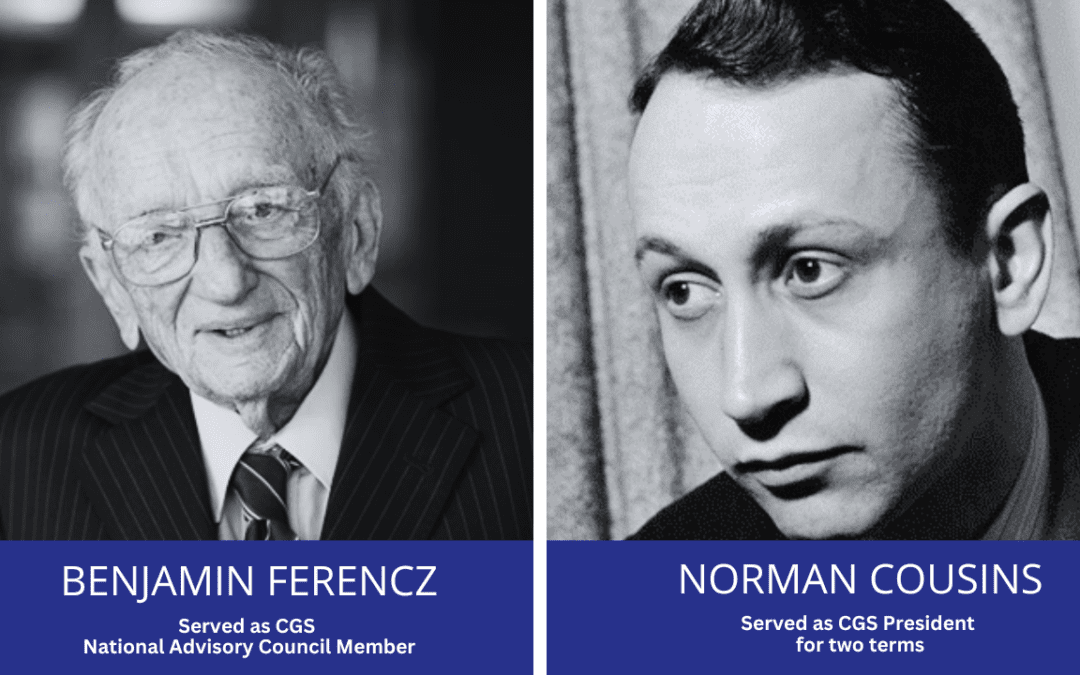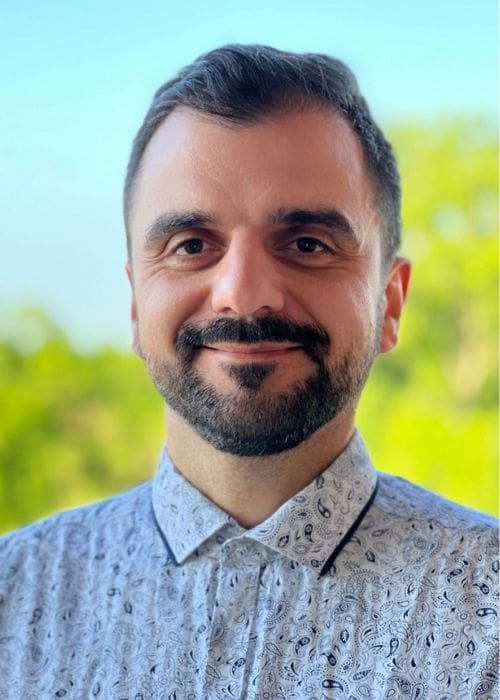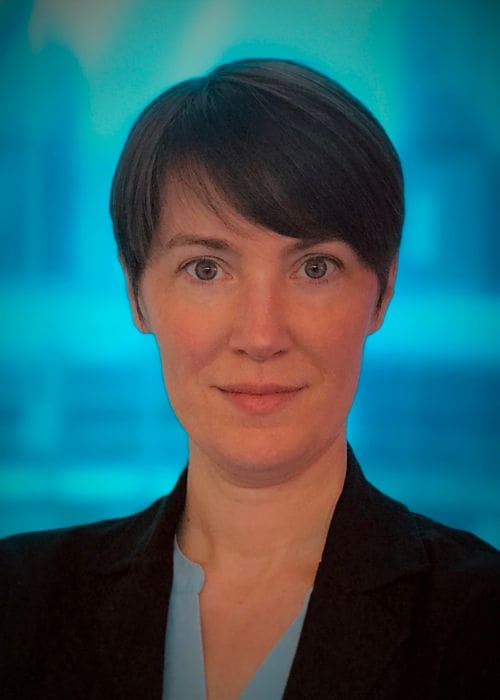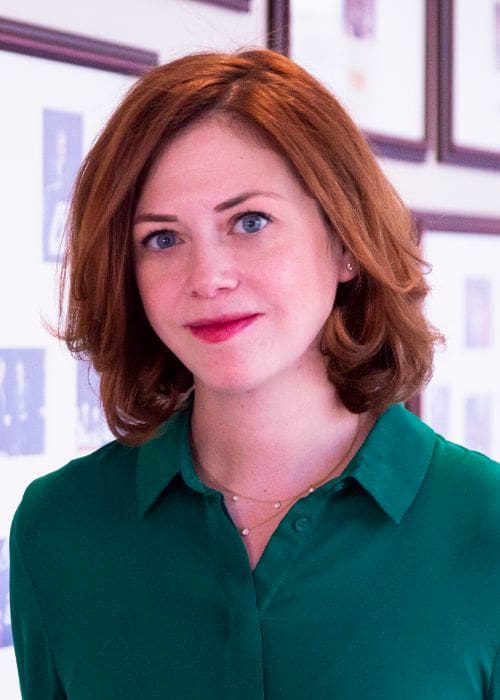
Benjamin Ferencz & Norman Cousins: The Original Influencers For Global Justice
The little known story of how American public outrage capitulated German lawmakers to compensate Polish survivors of Ravensbrück
With the passing of Benjamin Ferencz on April 7, humanity lost a tireless advocate for justice, world law, and human rights. Ben was a long-time CGS supporter, served as a National Council Advisor, and a world federalist.
On November 11, 2018, Citizens for Global Solutions honoured Ben with the Norman Cousins Global Governance Award which recognized his substantial contributions to world federation and improving global governance.
The following excerpt is Ben speaking at the awards ceremony about his friendship with Norman Cousins as well as their work ensuring compensation for the Ravensbrück survivors.
Ben’s Reflections on Receiving the Norman Cousins Global Governance Award:
A number of the Polish Catholic girls who were interned in the Ravensbrück Concentration Camp, and there they were subjected to a series of medical experiments by the Nazi troops in order to test out whether various glass in the wounds and sand in the wounds and other horrible experiments–how long will it take to cure them and what it took not to cure them.
And this is the subject of one of the subsequent Nuremberg trials, known as the Medical Case, which was one of the first cases after the trial by the International Military Tribunal against Göring.
Caroline Ferriday who is lady of some means and she had arranged to visit a number of the Polish Catholic girls who were interned in the Ravensbrück Concentration camp and there they were subjected to a series of medical experiments by the Nazi troops in order to test out whether the various glass in the wounds and sand in the wounds and- other other horrible experiments – how long will it take to cure them on what it took to not cure them and this is the subject of one of the subsequent Nuremberg trials, known as the Medical Case, was one of the first cases after the trial by the International Military Tribunal against Göring.
So, she was aware of this and she went to Norman Cousins and said, “Well, you are taking care of this Hiroshima Maidens, can’t you do the same for these Ravensbrück lapins?” Because lapins is French for “rabbits” or “guinea pigs” and were being used as human guinea pigs. And he agreed to try and help her and he set up a small committee. I was the pro bono counsel to that Committee because I negotiated with the German government about compensation for all of the Nazi persecution. And so, she visited me and I said I would try to get the German governments to agree, but it would be difficult because we had a complicated indemnification law. And it had no provision or made for compensate anybody in Poland and the Germans took a very harsh position.
Saying, look, we were at war with this country, they were killing our soldiers there we’re not going to compensate anybody our country with which we were at war. And the Committee took a dim view of that.
I met with the German Ambassador in Washington, and I said, “Look this is an exceptional case.” He said, “I’m sorry this is built with the legislature which we’ve done as much we tend to do.”
Whereupon the Committee arranged with Pan Am to fill up a plane with the ladies that we call the ‘Ladies from Ravensbrück’ and bring them to New York. And there we arranged for a ceremony to take place on the steps of St. Patrick’s Cathedral where they were greeted by the bishop or whoever it was saying, “you know, women of Ravensbrück, look what terrible things the Nazis did to you, and they refuse to compensate you for the lapins!” And so, we got a lot of publicity and the German Ambassador, whom I had pretty good relations, he sent me a copy of the cable that he had sent to Bonn [Germany].
Saying this is not a financial problem, this is a political problem so get them out of here. They’re going to go, we had arranged this visit, all the Senators who had a Polish constituency in the Senate to welcome the girls from Poland saying, oh look how terribly they were treated by the Nazis, and they won’t compensate them for anything, any come with you excuses and so on.
So, we’re going to put high pressure on and the Germans had to capitulate. And I was present in Bonn when the Cabinet called a Special Meeting on this question, whether they could expand their laws. And they all said, “make sure that that Ferencz guy doesn’t get involved in this thing. Anyway, he’s just making it hard until we don’t want anything to do with him.” I said that’s fine! But would you deal with the Red Cross, the International Committee of the Red Cross? And they agreed.
So, I flew to Geneva and set up arrangements whereby the German Government agreed to pay a fixed sum agreement. Norman Cousins was really the leader of the team meetings that took place in his office usually and he was fully involved, and he was writing about it all the time. So, it was largely as a result of his efforts that many people would not have been compensated.
We created whole system and Norman was really the leader of this and our meetings took place in his office, and he was fully involved, and he was writing about it all the time. So, it was largely as a result of his efforts that many people would not have been compensated, did receive compensation for some terrible wounds taken on deliberately by the Nazi regime. So, Norman and I were good friends, and I followed his career. When he was finally ill, and I recognized that he extended his own life expectancy by adopting of philosophy of making jokes and trying to keep up with your humor and everything he did certainly extended his life and he was a great man. I’m very honored to receive any award which bears his name.
Benjamin Ferencz is remembered for being a lead investigator in the Nuremberg Trials where all of the 22 defendants were convicted and a tireless advocate for the International Criminal Court (ICC). Additionally, Ben was also a staunch world federalist and served on CGS’s National Advisory Council for decades and is the author of Planethood, which makes the case for a democratic world government. May his legacy be an inspiration for justice and peace.
Norman Cousins was the editor of the Saturday Review for more than thirty years and had a powerful platform from which to help shape American public debate during the height of the Cold War. Under Cousins’ leadership, the magazine was considered one of the most influential in the literary world. Cousins’ progressive, nonpartisan editorials in the Review earned him the respect of the public and US government officials. Norman was also a world federalist and peace activist and served as CGS’s President twice from 1952-1954 and again from 1976-1990.






























